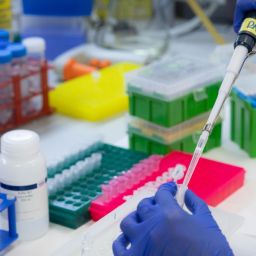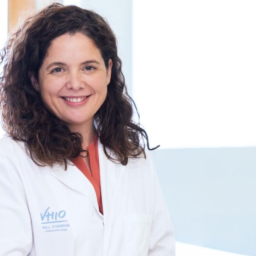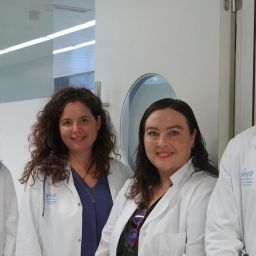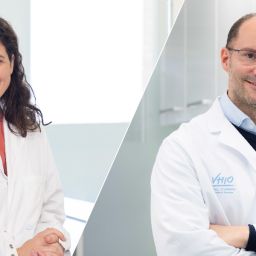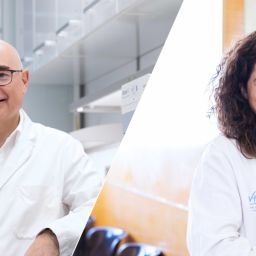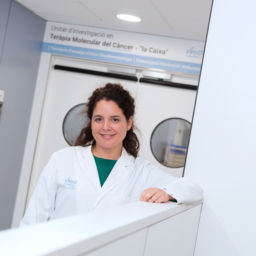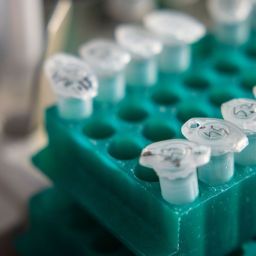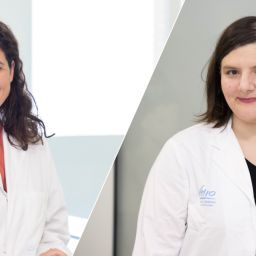
For many cancer patients, clinical trials are a new opportunity for treatment, especially in cases where various therapies have been applied without success.
One of the strategic objectives of the Vall d’Hebron Institute of Oncology (VHIO) is to develop a translational research model capable of transferring lab discoveries to clinical practice in the shortest time possible through clinical trials. With this goal in mind, the VHIO Research Unit for Molecular Therapy of Cancer UITM-CaixaResearch (UITM-CaixaResearch) was created in 2010 with support from “la Caixa” Foundation. Located on the Vall d’Hebron Campus, it coordinates and conducts complex clinical trials with medication in early development (Phase I and initial Phase II trials) focusing on innovative options for cancer treatment.
“By fostering a close connection between oncological care and research, we establish new therapeutic models for patients with extremely selective drugs and we make advances in the knowledge of types of tumours and how to treat them individually, achieving the most suitable treatment for each patient at the precise moment”, says Dr Elena Garralda, director of the UITM-CaixaResearch and head of the Early Clinical Drug Development Group at VHIO.
More than 9,200 patients included in early-phase clinical trials
9,259 cancer patients with no possibility of treatment with available commercial options have taken part in some of the 2,821 early-phase clinical trials (1,613 phase 1 or basket; 1,208 phase 2) conducted at UITM-CaixaResearch since 2010, giving them new treatment opportunities. Eight of these trials are therapies developed at VHIO, three of them first-in-human. In other words, three drugs developed at VHIO labs have reached the clinical phase and are being tested on patients for the first time in early-phase clinical trials.
 Thanks to the clinical trials at UITM – CaixaResearch, regulating agencies, mainly the FDA (US Food and Drug Administration) and EMA (European Medicines Agency), have approved 61 new medications and indications for treating cancer. Nineteen received accelerated approval, which means drugs from early-phase trials can be approved for patients with no other treatments or no effective available treatments.
Thanks to the clinical trials at UITM – CaixaResearch, regulating agencies, mainly the FDA (US Food and Drug Administration) and EMA (European Medicines Agency), have approved 61 new medications and indications for treating cancer. Nineteen received accelerated approval, which means drugs from early-phase trials can be approved for patients with no other treatments or no effective available treatments.
These drugs are newly created medicines or medications that have already been approved having proven efficacy for another type of tumour.
“By developing more effective drugs, introducing biomarkers and the current design of clinical trials that enable us to assess both the safety and efficacy of new drugs in a single trial, we are able to shorten total development and approval times for new indications. In recent years we have gone from an average of 8 to 10 years to between 2 and 5”, says Dr Garralda.
“On the one hand, this is a direct benefit for patients participating in clinical trials who thus have new treatments that they would otherwise have no access to. And on the other, it is an advance in clinical research with the goal of improving survival rates and quality of life for all people with cancer”, she concludes.
Extension of UITM-CaixaResearch
In order to maintain this growth and continue offering the best care quality, in 2022 VHIO extended and optimised the UITM-CaixaResearch facilities to the current 1,000 m2; it has 18 treatment stations plus two treatment beds for more delicate patients or for studies that require an isolated area. These improvements are added to the extension of the Clinical Research Oncology Pharmacy Unit in 2019 to respond to needs generated by the high number of clinical trials. Spaces for processing patient samples have also increased.
Comprehensive multidisciplinary team
Excellent patient treatment and care, as well as pioneering research, are all possible thanks to a multidisciplinary team including specialists in oncology, pathology, radiology and interventional radiology, oncological nursing staff and oncological clinical research staff, and the Clinical Research Oncology Pharmacy Unit, clinical trials offices with data managers and coordinators. In short, a team of 237 professionals working towards the common goal of continuing research to design and develop new clinical trials that become new opportunities for people with cancer.
World Cancer Research Day
World Cancer Research Day is celebrated on 24 September to raise public awareness around the need to continue researching to understand more about this disease and be capable of developing new prevention, diagnosis and treatment strategies. The World Health Organization (WHO) estimates that 35 million new cancer cases will be diagnosed worldwide in 2050 compared to the 20 million estimated cases in 2022. Cancer is still the second most common cause of death in the world. Even though survival rates continue to improve thanks to research, many types of tumour still lack effective treatment and therefore research is key to progress in cancer treatment.

